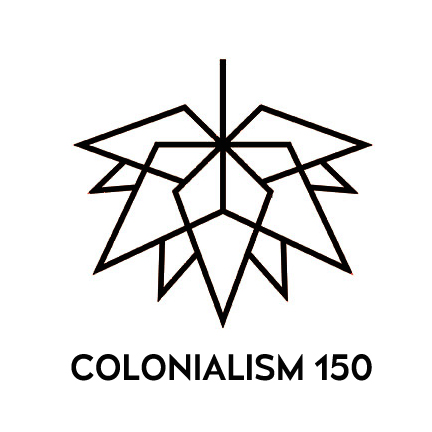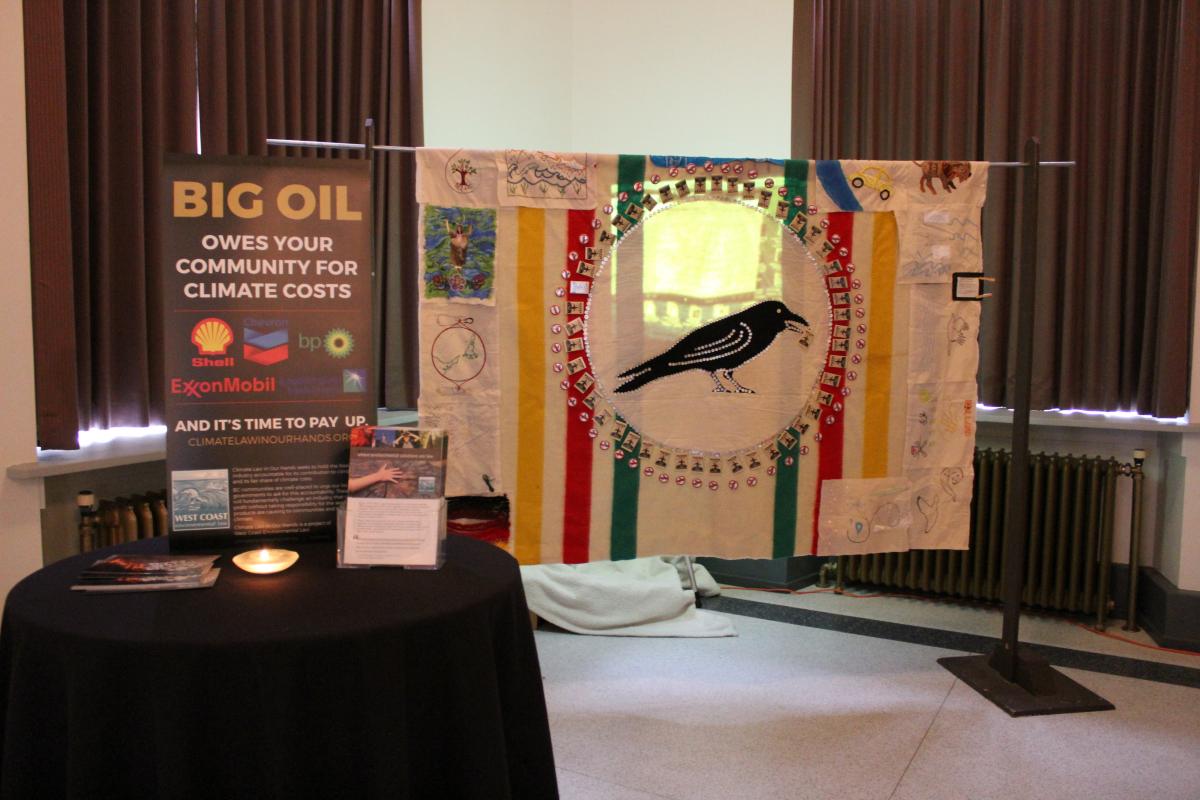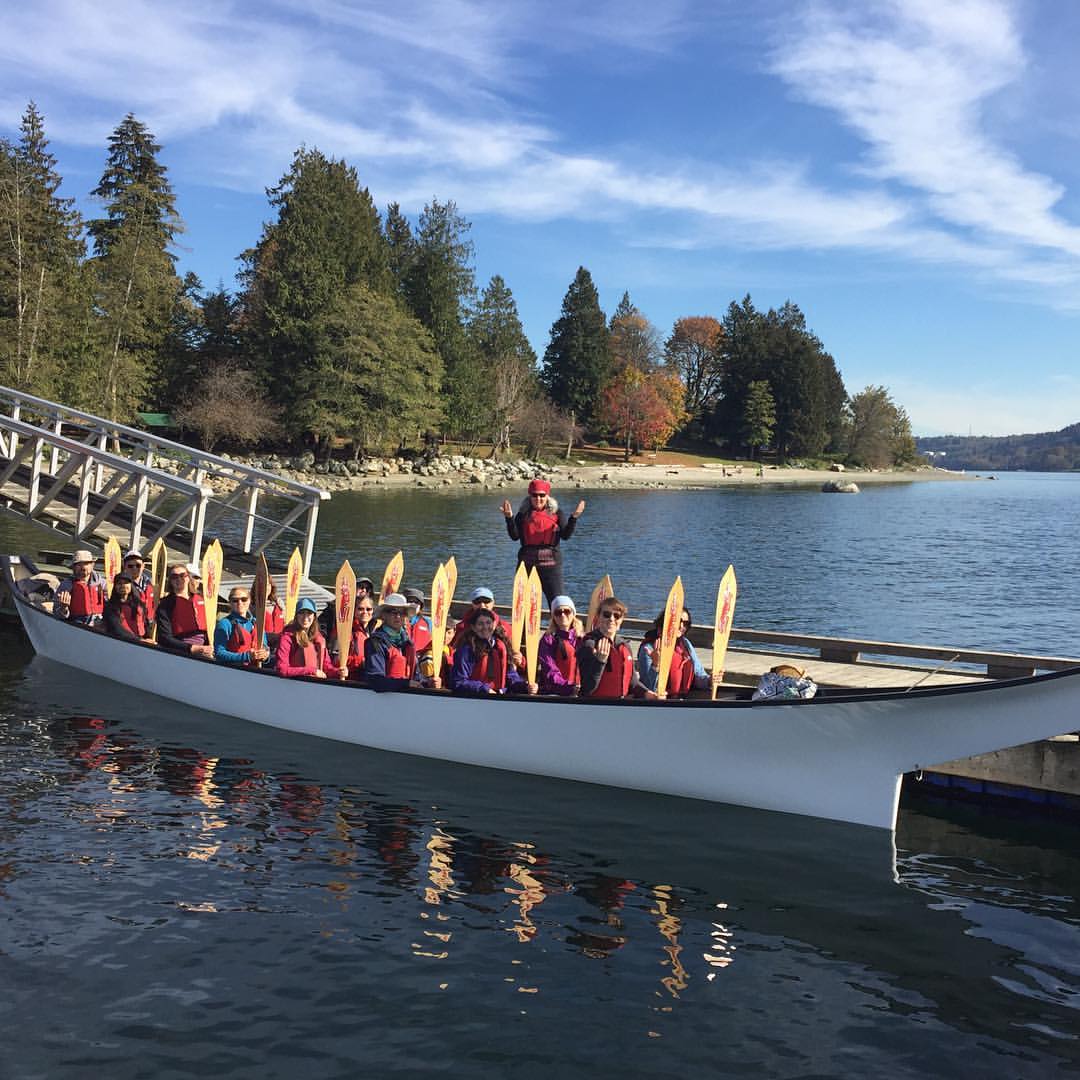
It's a beautiful morning and I'm walking in my small Gulf Island community with my wee grandson. Birds chirping, flowers blooming, wee grandson cooing. It's all open-hearted love and happiness as I push the baby stroller through the island's downtown area, sometimes pausing to play with the wee one's impossibly soft feet.
A group of men [dare I say "White"] sit under the cherry tree outside the cafe chatting over coffee. I'm taking the babe out of the stroller and overhear one of them talking about “natives.” My ears perk up and I quiet my breath to eavesdrop on their conversation.
Past experience with the term “native” warns me to watch out. Stay vigilant. In my experience, “native” seems to be the preferred term of white guys with bad attitudes so I want to stay alert, protective of my space and the baby.
The speaker is talking about water on reserves . . .
“Oh yeah. Har-har-har. You hear about all these natives that can't drink their water so the government pays to deliver bottled water to them. Lucky them, I wish the government would deliver my bottled water for free,”
The remark is followed by “Har-har-har” from the others at his table.
The guy telling the story is someone I've known for years. He's respected in our small community, seen as someone who steps up to assist people in need. He volunteers, donates time and money to individuals and groups on the island, is there to help in emergencies, so I was shocked and disappointed to hear him speaking like this. I like to think the best of people and hope after I left he went on to explain that bottled water is no replacement for the clean spirited water these communities used to be able to rely on before it was contaminated by industrial development.
The conversation reminded me of another time when a friend innocently asked me why Indigenous people should be "given" land. Or another time when an acquaintance speculated that Indian Residential Schools were comparable to English boarding schools. One year on Remembrance Day, another islander and I discussed and then argued about the importance of remembering after I'd commented that many (perhaps most?) Canadians have selective memories. While we're comfortable remembering those who died in the two world wars, most Canadians find it difficult to remember where their collective material wealth comes from: namely, the death of millions of Indigenous people because of the deliberate introduction of disease, forced residential schooling, and the taking of their lands.
I realize you may be uncomfortable reading this but I invite you to stay with me and go a little deeper.
Conversations like these have changed the way I feel about my community. While we may be close in many ways (sharing similar values, lifestyle, etc.), these tensions in our relationship show that, in fact, we're miles apart on issues that are central to my understanding of the world.
People seem to have a shallow understanding of the lives and conditions of Indigenous people. They don’t want to think very deeply about Canadian colonial history (or examine how they might be implicated) because it makes them feel guilty or sad. But as Martin Luther King points out, "Shallow understanding from people of good will is more frustrating than absolute misunderstanding from people of ill will. Lukewarm acceptance is more bewildering than outright rejection."
So I take seriously Jeannette Armstrong’s suggestion and write to affirm the past and tell what really happened. This too is part of the healing: "The dispelling of lies and the telling of what really happened until everyone, including our own people understands that this condition did not happen through choice or some cultural defect on our part."
Sometimes to dispel lies like these we must stand up and speak out with unpopular messages to break the silence.
Maybe because of my refusal to be silent and the possibility that I might say something that “unsettles the settlers,” my friends and acquaintances know not to invite me to their Canada Day picnics. My presence could become an uncomfortable reminder of what most people would rather not acknowledge or respond to. Polite conversations don’t include talking about Canada’s colonial history and current reality. On these issues, polite conversations adopt a kind of silence – a falseneutrality which perpetuates the colonial status quo .
People don’t want to think about it because if one thinks (even a little bit) about this stuff and then does nothing, one becomes morally complicit, and who wants to feel they've contributed to 150 years of oppression?
Sometimes I feel like I'm surrounded by people who don't get it. By contrast, in my work circles, colleagues and I are able to discuss concepts like government apologies, the contrast between good deeds and mere good words and all the hoopla around Canada 150.
Then this: As I’m on the ferry writing this, I'm sitting in the cafeteria and have taken a seat near a group of [white] guys, maybe in their 60s. I overhear something about “natives” . . .
“. . . Defeated my ass. They're doing better than me. Har har har.”
“Especially the chiefs.”
“You know the chief that has the vineyards on Osoyoos? He can't get his own people to show up for work.”
“They don't want to work.”
“Oh ya – They could have pushed Northern Gateway through, and had lots of work. But really, they don’t want to work.”
“Ya.”
There are times to speak up, but my former ambulance-attendant self warns me, “Ensure no danger.” Speaking up to this group might not be safe and we choose our battles, right?
Instead I debrief with my husband or friends, who sometimes get impatient with me because I constantly bring up these kinds of conversations. When I worked at a law school, I heard [white] students say Indigenous students should develop thicker skins so they wouldn’t be so hurt or distracted by racist or uninformed comments. Maybe my husband and friends think I need thicker skin.

Photo: Maxine Hayman Matilpi's raven button blanket alongside a display about our Climate Law in Our Hands work
So it's almost July 1, 2017 and outside our office, people are celebrating 150 years of colonial domination. Meanwhile inside our office, we’re doing an intersectional examination of Canadian history.
People here are trying hard to become good allies. We’ve considered the TRC’s 94 Calls to Action as well as the specific challenge to law firms from the JFK Law Corporation to “critically examine our practices and assess whether we are advancing Indigenous legal systems and perspectives.” We’ve come up with our own term, “reconciliACTION,” to emphasize our need to not only think and talk, but also do.
My colleagues are willing to decentre their own experiences, face their settler discomfort head-on and even agree with me when I remind them (per Trish Monture) that "every oppression that has been foisted upon Indigenous people in the history of Canada has been implemented through laws." We’re able to have conversations about the "logic of dominance" and (as Pepper-Smith and Ford suggest) talk about how privileged people can be blind to the barriers that exist for people who have been not privileged. Or we can consider what it means to come to terms with the irritating experience of feeling "the sense of alienation, of not belonging, of having [Canada] criticized and scrutinized from the point of view of those who have been harmed by it, having important concepts central to it dismissed, being viewed with mistrust. . ."
Over coffee we myth-bust the doctrine of discovery and terra nullius, and on a good day at lunch we might even discuss how the "the test of strength of any ideology is the extent to which its basic pre-suppositions remain not merely unquestioned but literally unrecognized.” We try to acknowledge that “change comes with learning to see and understand the world through new perspectives, understanding the feelings of those who see it differently, and learning to accord equal respect to those differences, those realties and the people whose lives they reflect."
I see my colleagues as willing and able to accept their responsibility to be informed, to challenge colonial hegemony and to try to understand this asymmetrical relationship with Indigenous peoples by continuously learning, by demonstrating patience and by coming to terms with their own sense of alienation and having their world/country scrutinized from the point of view of those who have been harmed by it.
So maybe by challenging colonial concepts and assumptions I haven’t been invited to the Canada Day picnic or I’ve lost a few Facebook friends. But I work with people who, when asked what “Unsettling 150” means to them, say:
Eugene
I see my role in #Resistance150/ReconciliACTION as an accomplice to help dismantle systems of white supremacy, patriarchy and colonial mindsets. A bridge to immigrant settler communities to deepen the understanding and relationship to the land and to Indigenous peoples and worldviews. My hope for Nation-to-Nation relationships is a free prior informed consent regime where the right to say no is respected, and mutual consent is the accepted condition for advancement.
Mari
Reconciliation to me is about rebuilding relationships in an honest, equitable and respectful way. It means deconstructing how we understand the past and changing our current official legal narratives to reflect our true history. It means recognizing the equal importance of civil, common and indigenous law.It means working to heal the intergenerational trauma caused by residential schools and changing our criminal system, which systematically disadvantages indigenous people.
Georgia
To me, #Resistance150 honours the many, diverse ways that those living on Turtle Island express their love for the land, people, and other beings we share it with. Resistance is an act of love for what is being lost. We take care of what we love and we love what we know. As a lawyer, I have an ethical obligation to learn and uphold the laws of this land, which include Indigenous laws that predate colonization. I am committed to learning from the Indigenous laws in the territories that I live and work on, to upholding these laws in my work and personal life, and to sharing what I learn with those around me. My hope is that through conversation all of us can learn to love more deeply for the land and the other beings we share it with, including each other.
Jen
When I think of Canada 150 and Indigenous law, I think of the stories I have witnessed of the Douglas Treaties as (broken) promises to live as neighbours respecting WSANEC, Songhees, and Esquimalt law. I think about how land theft and the residential school system continue to benefit my family as settlers today. I ask how I can make time to show support for local people in my day-to-day. I picture a group of people- indigenous and local, settlers and newcomers, sitting together over a meal to celebrate a long day of learning and planning together.
Matt
To me, unsettling is not just “redwashing” Western structures and systems. Unsettling is Indigenous Nations working with their own laws, in their own ways, with control over their own lands, including projects like ensuring Indigenous peoples benefit first from the zero-carbon transition. Unsettling is continuing to learn.
Molly
When I think of Canada150 and Indigenous law, I think of the incredible opportunity we have to share our collective wisdom and learnings from past transgressions, to lift our country up to the highest esteem through open listening, reconciliation, collaboration and action. Indigenous Law has the capacity to guide us in our journey as both the children and the guardians of the Earth.
Barb
I’m looking forward to a Canada where we act, talk and work together like treaty people on this beautiful land, knowing how much working in partnership lifts us all up, our children and all those to come. This country that I love has a lot of work to do to make things right. I look forward to continue supporting with heart, mind and hands all the great work Indigenous people, organizations and communities are doing to show us the way.

West Coast staff on the water with Takaya Tours
Deborah
I am inspired by, and want to learn more about the Indigenous law and culture of Coast Salish nations and how they have lived sustainably in this region since forever. Coming to understand some of the ways that settler laws and practices harmed and continue to harm Indigenous peoples is pretty disheartening and sobering for a lawyer practicing in that system, but the resilience not to mention the generosity and positive energy that continues to be offered by Indigenous people makes me hopeful. I respect the grief and the anger and the frustration too. I feel it is a big responsibility of my generation of settlers to do everything we can to participate in the work of reconciliation.
Erica
I see my role in #Resistance150/ReconciliACTION as being the best ally I can be. This means educating myself, listening, and showing up in support of Indigenous self-determination!
Robert
#Resistance150 has inspired me to learn more about how the first peoples were part of the foundations of Canada. I want to learn more about leaders like The Honourable Len Marchand, Chief George Manuel and Chief Nicola-major figures in the history of Kamloops my hometown and all of Canada. I want to learn why people do not know them or their stories and why many Canadians choose to be blind to the injustices Canada has caused on the first peoples.
Nico
I am committed to consistently learning about Canada’s historic and ongoing colonization, unlearning harmful settlor ways of being, and working in service of a robust, meaningful, and just Nation-to-Nation relationship with Indigenous Nations. To me this requires recognizing that Indigenous Law is law and committing to the multi-juridical potential of Canada’s legal system.
Alexis
To me, #Resistance150 means resisting the temptation to forget about the injustices that have occurred throughout Canada’s history and still continue today. It means taking time to listen, read, and confront some difficult truths. As settlers, I think we have so much to learn from the Indigenous peoples who have lived here and stewarded these lands and waters for millennia. Learning about Indigenous legal traditions has changed the way I think about law and about our responsibilities to take care of the Earth. As my colleague Maxine has put it, “The planet needs what Indigenous perspectives have to offer – and we all need to listen deeply.”
Jessica
To me #Resistance150 means holding two colliding realities simultaneously: one, an aspirational view of Canada –the Canada of universal health care, multi-culturalism, civility, global responsibility and the potential for reconciliation –the other, the ongoing legacy of colonialism, dispossession, and genocide upon which our country is founded and from which non-Indigenous Canadians continue to benefit. A “two-eyed” approach challenges us to act on both western and Indigenous laws, knowledge and worldviews in caring for the land and water. I am working to keep both my eyes open to the realities of what Canada is, and could be. I believe a path of healing and transformation in our relationships to each other, and to the land is possible, but we have a lot of work ahead.
Anna
I believe reconciliACTION must involve respecting the inherent authority of Indigenous peoples through true collaborative co-governance, in which Indigenous and Crown authorities collaborate from the very earliest stages of decision- making processes that affect them, their rights and their territories.
Anjali
In light of Canada150, I am committed to learning more about the history of this land and resisting the violence of amnesia. I want to interrupt and challenge the premise of Canada150 and centre the voices of the indigenous peoples whose land we live on and who are bearing the ongoing burden of colonialism. #Resistance150
Top Photo: Colonialism 150 logo. Image by Eric Ritskes